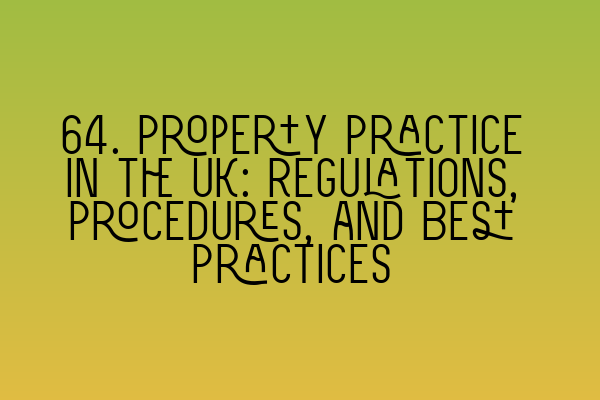64. Property Practice in the UK: Regulations, Procedures, and Best Practices
Welcome to the SQE Property Law & Land Law blog, where we provide valuable insights into the world of property practice in the UK. In this article, we will explore the regulations, procedures, and best practices that every property lawyer should know in order to navigate the complex landscape of property transactions. Whether you are a solicitor, aspiring lawyer, or simply interested in property law, this article aims to provide you with a comprehensive understanding of the field.
Before we delve into the depths of property practice, it is important to mention that if you are preparing for the SQE 1 exam or SQE 2 exam, we offer comprehensive preparation courses. These courses are designed to help aspiring lawyers succeed in their exams and start their career on a solid foundation. Click here to explore our SQE 1 Preparation Courses and here for our SQE 2 Preparation Courses.
Now, let’s dive into the regulations, procedures, and best practices that are essential in property practice:
1. Understanding Property Regulations:
Property practice in the UK is governed by a complex web of regulations, including the Land Registration Act 2002, the Law of Property Act 1925, and various other statutes and regulations. These regulations outline the rights and responsibilities of property owners, the process of registering land, and the legal framework for property transactions. It is crucial for property lawyers to have a deep understanding of these regulations to ensure compliance and protect their clients’ interests.
2. Conveyancing Procedures:
Conveyancing is the process of transferring legal ownership of a property from one party to another. It involves various steps, including conducting searches, drafting contracts, negotiating terms, and ensuring a smooth transfer of funds. Property lawyers play a pivotal role in guiding their clients through these procedures and ensuring that all legal requirements are met. Thorough knowledge of conveyancing procedures is essential for a successful property practice.
3. Land Registration:
Registering land is an integral part of property practice in the UK. The Land Registration Act 2002 introduced a system of electronic land registration, making it easier to establish and prove ownership of land. Property lawyers need to be well-versed in the process of land registration, including preparing and submitting applications, dealing with title issues, and understanding the implications of registered and unregistered land. A solid understanding of land registration is crucial for property lawyers to safeguard their clients’ interests.
4. Commercial Property Transactions:
Commercial property transactions require a specialized set of skills and knowledge. Property lawyers involved in commercial property work need to understand lease negotiations, property development agreements, planning and zoning regulations, and various other facets of commercial property law. Successful property practice in the commercial sector requires a deep understanding of the intricacies involved in these transactions.
5. Best Practices in Property Practice:
To excel in property practice, it is essential to adhere to best practices that promote efficiency, accuracy, and integrity. This includes diligent record-keeping, clear communication with clients and other parties involved, thorough due diligence, and keeping up-to-date with changes in property law and regulations. Property lawyers should also prioritize professional development through continuing education and attending relevant conferences and seminars.
In conclusion, the field of property practice in the UK is multifaceted, constantly evolving, and requires a deep understanding of regulations, procedures, and best practices. Whether you are an aspiring solicitor or an experienced property lawyer, staying up-to-date with the latest developments in property law is crucial for success.
If you are preparing for the SQE 1 or SQE 2 exams, we highly recommend exploring our SQE preparation courses. Click here for SQE 1 Practice Exam Questions and here for SQE 1 Practice Mocks FLK1 FLK2. For SQE 2 Preparation Courses, click here. Additionally, make sure to stay informed about the SRA SQE exam dates, so you can plan your preparation effectively. Click here for more information on SRA SQE Exam Dates.
We hope you found this article insightful and informative. Stay tuned for more engaging and educational content related to property law and land law in the UK.
